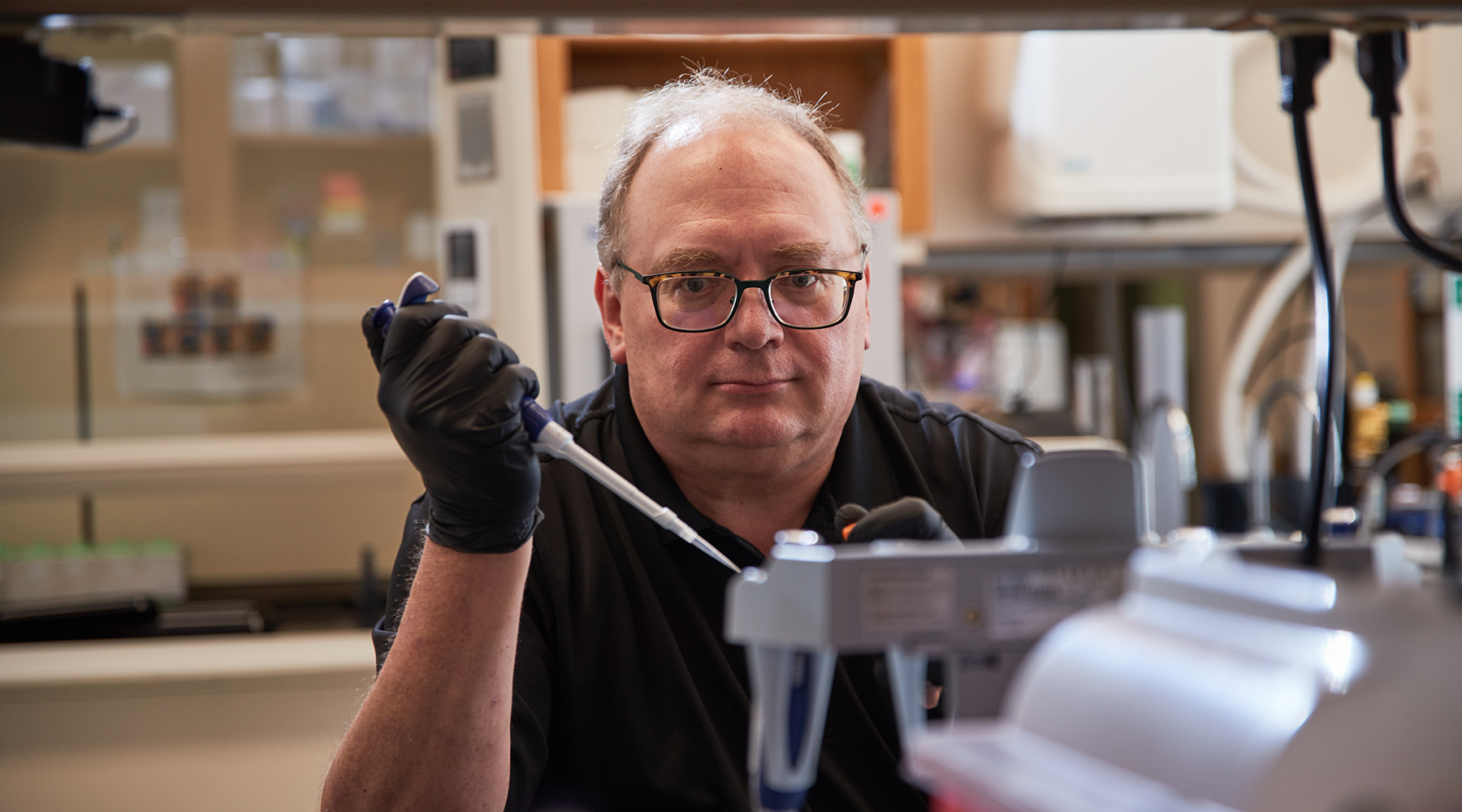Joel Guthridge, Ph.D.
Associate Professor
Arthritis & Clinical Immunology Research Program
My 101
My laboratory research focuses on understanding mechanisms that contribute to the development and progression of human autoimmune diseases. We expand upon more than 20 years of pioneering genetic work done at OMRF that defined what and which genes contribute to a patient’s risk to develop an autoimmune disease. Now we focus on understanding how those genes work, the mechanisms that are changed in one’s cells that lead eventually to autoimmunity.
It is imperative that we better understand the underlying causes and progression of systemic autoimmune diseases like lupus, multiple sclerosis and others, and that task requires unraveling vast networks of interconnected immune responses. Our primary focus is defining, at a systems level, the pathways that influence the regulation and development of autoimmune responses. Ultimately, this information can be used either to define pathways that contribute to disease characteristics in those patients, thereby identifying the drug targets for that subgroup of patients, or it can allow physicians to better predict the disease course of a patient, tailoring treatments to the individual’s unique profile.
All of our research revolves around interfacing with and pushing the limits of what we can do for the patients in OMRF’s clinics for lupus, multiple sclerosis, rheumatoid arthritis, Sjögren’s and other autoimmune conditions. Our ultimate goals are: 1) to improve patient care by helping create more accurate diagnostic tools and new methods to determine a person’s risk of developing a disease or predicting how individuals will respond to certain medications, and 2) to understand molecular pathways that contribute to the development or progression of the disease, and thereby identify potential new drug targets that will help treat these devastating diseases.
Research
My research focuses on understanding the etiology and pathogenesis of systemic autoimmune diseases. This requires unraveling vast networks of interconnected immune responses, a task that exceeds the limitations of traditional laboratory methods. My group applies high-throughput/high-content, precision medicine approaches to this problem. Our primary focus is defining, at a systems level, the pathways that influence the regulation and development of autoimmune responses.
I was involved in some of the early candidate gene association studies, and then in the whole genome association studies in lupus. I have also been intimately involved with large consortium studies and many follow-up fine mapping studies through my management of several large collections of lupus samples and data in the OMRF Biorepository and Sample Procurement Core. These results led to studies on the functional effects of disease-associated genetic variants, particularly in genes affecting the complement regulatory proteins/receptors, innate immune responses, and B cell signaling pathways.
To gain a high-level view of immune function in patients with autoimmune disease, we use a systems biology approach to combine data from our genetic/genomic studies, innovative biomarker assessments, cellular immunophenotyping experiments, and single cell proteomics analyses. Because multiple immune pathways can lead to the same autoimmune disease diagnosis, we also use these multidimensional datasets and associated clinical data to cluster patient subpopulations and model altered pathways in various populations. We apply these methods both in translational studies of cross-sectional and longitudinal autoimmune disease cohorts, and in investigator-initiated clinical trials. The ultimate goal of this work is to enable more accurate diagnosis, risk assessment before clinical disease onset, and prediction of therapeutic responses in order to improve patient care.
Brief CV
B.S., University of Iowa, Iowa City, IA, 1985
Ph.D., University of Kentucky, Lexington, KY, 1992
Postdoc, University of Colorado Health Sciences Center, Denver, CO, 1996
MSCIS, Regis University, Denver, CO
Joined OMRF scientific staff in 2002
Publications
Recent Publications
Inamo J, Keegan J, Griffith A, Ghosh T, Horisberger A, Howard K, Pulford JF, Murzin E, Hancock B, Dominguez ST, Gurra MG, Gurajala S, Jonsson AH, Seifert JA, Feser ML, Norris JM, Cao Y, Apruzzese W, Bridges SL, Bykerk VP, Goodman S, Donlin LT, Firestein GS, Bathon JM, Hughes LB, Filer A, Pitzalis C, Anolik JH, Moreland L, Hacohen N, Guthridge JM, James JA, Cuda CM, Perlman H, Brenner MB, Raychaudhuri S, Sparks JA, Accelerating Medicines Partnership RA/SLE Network, Holers VM, Deane KD, Lederer J, Rao DA, Zhang F. Deep immunophenotyping reveals circulating activated lymphocytes in individuals at risk for rheumatoid arthritis. J Clin Invest 135, 2025 March, PMID: 40091833, PMCID: PMC11910230
Zaslavsky ME, Craig E, Michuda JK, Sehgal N, Ram-Mohan N, Lee JY, Nguyen KD, Hoh RA, Pham TD, Röltgen K, Lam B, Parsons ES, Macwana SR, DeJager W, Drapeau EM, Roskin KM, Cunningham-Rundles C, Moody MA, Haynes BF, Goldman JD, Heath JR, Chinthrajah RS, Nadeau KC, Pinsky BA, Blish CA, Hensley SE, Jensen K, Meyer E, Balboni I, Utz PJ, Merrill JT, Guthridge JM, James JA, Yang S, Tibshirani R, Kundaje A, Boyd SD. Disease diagnostics using machine learning of B cell and T cell receptor sequences. Science 387:eadp2407, 2025 February, PMID: 39977494
Yuan X, Qin X, Takemoto K, Zhao J, Sanderson M, Xu X, Zhang Y, Helke KL, Jacobs Wolf B, Guthridge JM, James JA, Zhou X, Assassi S, Feghali-Bostwick C, Wang D, Sun L, Tsao BP. Human hypofunctional NCF1 variants promote pulmonary fibrosis in the bleomycin-induced mouse model and patients with systemic sclerosis via expansion of SPP1( ) monocytes-derived macrophages. Ann Rheum Dis 84:294-306, 2025 February, PMID: 39919902, PMCID: PMC11907366
Selected Publications
Lu R, Munroe ME, Guthridge JM, Bean KM, Fife DA, Chen H, Slight-Webb SR, Keith MP, Harley JB, James JA. Dysregulation of innate and adaptive serum mediators precedes systemic lupus erythematosus classification and improves prognostic accuracy of autoantibodies. J Autoimmun. Nov;74:182-193. PMID: 27338520 PMCID: PMC5079766
Slight-Webb S, Lu R, Ritterhouse LL, Munroe ME, Maecker HT, Fathman CG, Utz PJ, Merrill JT, Guthridge JM, James JA. 2016. Autoantibody-Positive Healthy Individuals Display Unique Immune Profiles That May Regulate Autoimmunity. Arthritis Rheumatol. Oct;68(10):2492-502. PMID: 27059145 PMCID: PMC5042816
Dozmorov I, Dominguez N, Sestak AL, Robertson JM, Harley JB, James JA, Guthridge JM. 2013. Evidence of dynamically dysregulated gene expression pathways in hyperresponsive B cells from African American lupus patients. PLoS One. 8(8):e71397. PMID: 23977035 PMCID: PMC3744560
Guo L, Deshmukh H, Lu R, Vidal GS, Kelly JA… and Guthridge JM. 2009. Replication of the BANK1 genetic association with systemic lupus erythematosus in a European-derived population. Genes Immun 10(5):531-8. PMID: 19339986 PMCID: PMC2736873
The International Consortium for Systemic Lupus Erythematosus Genetics (SLEGEN) , Harley JB, Alarcón-Riquelme ME, Criswell LA, Jacob CO… Guthridge JM, et al. 2008. Genome-wide association scan in women with systemic lupus erythematosus identifies risk variants in ITGAM, PXK KIAA1542 and other loci. Nat Genet. 40(2):204-10. PMID: 18204446 PMCID: PMC3712260
Nath SK, Han S, Kim-Howard X, Kelly JA, Viswanathan P… Guthridge JM*, and Harley JB*. A nonsynonymous functional variant in integrin-alpha(M) (encoded by ITGAM) is associated with systemic lupus erythematosus. Nat Genet. 2008;40(2):152-4. (*authors contributed equally) PMID: 18204448
Contact
Arthritis & Clinical Immunology Research Program, MS 53
Oklahoma Medical Research Foundation
825 N.E. 13th Street
Oklahoma City, OK 73104
Phone: (405) 271-2600
Fax: (405) 271-7063
E-mail: Joel-Guthridge@omrf.org
For media inquiries, please contact OMRF’s Office of Public Affairs at news@omrf.org.
Lab Staff
Miles Smith, Ph.D.
Bioinformatics Scientist
Susan Braganza
Manager Core Facility
Marci Beel
Manager Laboratory
Matthew "Caleb" Marlin, Ph.D.
Project Manager
Jeanette Smith
Assistant Laboratory Manager
Wade DeJager
Senior Scientific Systems and Data Management Developer
Nicolas Dominguez
Senior Technical Specialist
Laura Battiest
Research Technician III
Hunter Barnard
Research Technician II
Sidney Bayless
Research Technician I
Liz Bradshaw
Research Technician I
Kora Goddard
Research Technician I
Majood "Majd" Haddad
Research Technician I
Benjamin "Ben" Jones
Research Technician I
Todd Mangile
Research Technician I
Blake Mosshart
Research Technician I
Robert Renobato
Research Technician I
Christian Wright
Graduate Student
Veronica Gregory
Administrative Assistant IV






